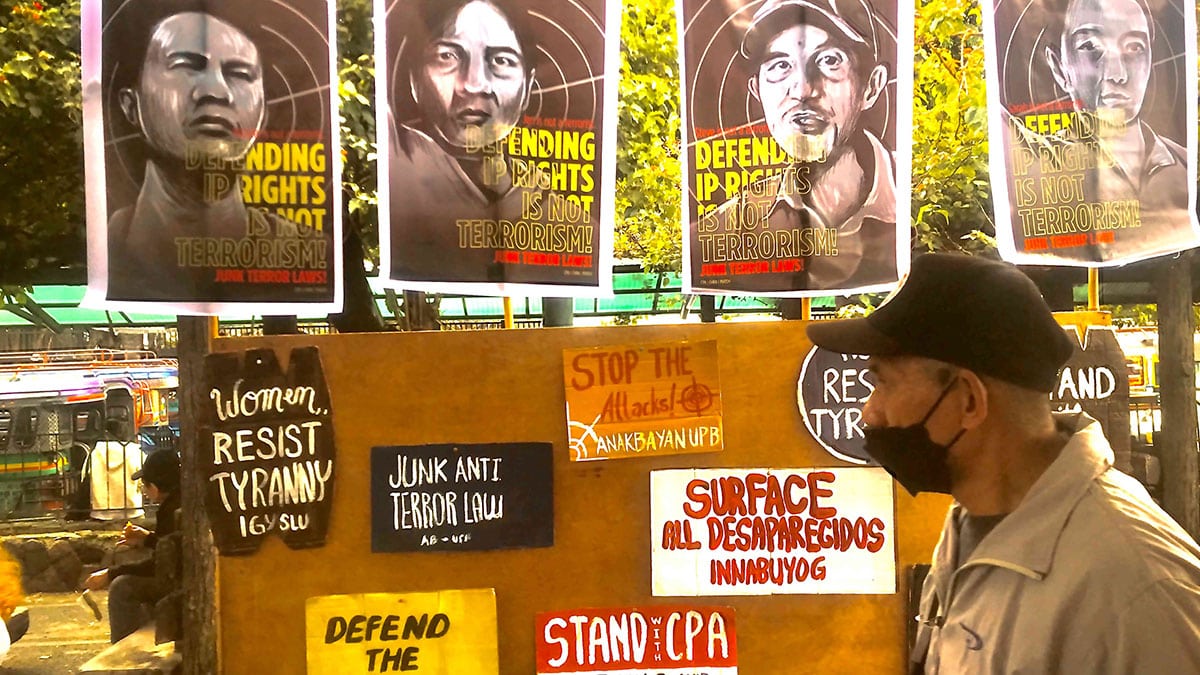Baguio to penalize Red-tagging

DELIVERANCE Illustrations of four indigenous Cordillerans who sued the government for declaring them terrorists without due process are put up at Baguio City’s Igorot Park during this year’s Human Rights Day on Tuesday. —Vincent Cabreza
BAGUIO CITY, Philippines — Red-tagging and other forms of intimidation will soon be punishable offenses in Baguio City, following the passage of a measure aimed at protecting activists from harassment and vilification by law enforcement and government officials.
The proposed ordinance was approved on Monday during the regular session of the city council, just ahead of Tuesday’s Human Rights Day celebration.
It was transmitted to Mayor Benjamin Magalong for signing for the measure to become a local law.
READ: A slap in the face of red-taggers
Magalong, who was expected to sign the measure, was himself a victim of Red-tagging by a former National Task Force to End Local Communist Armed Conflict official after the mayor ordered the removal of posters labeling student activists as terrorists.
Passed with 11 affirmative votes and three abstentions, the measure titled “Human Rights Defenders Ordinance” is designed to shield activists from threats, defamation and harassment.
It includes penalties for public officials and state agents who engage in Red-tagging and mechanisms for redress.
The measure underwent a year of public hearings and rigorous deliberation. Despite opposition from the Armed Forces of the Philippines and the Philippine National Police that argued that existing human rights policies were sufficient, Councilors Peter Fianza, Jose Molintas, Arthur Allad-iw and Fred Bagbagen successfully pushed for its enactment.
Romel Daguimol, regional director of the Commission on Human Rights in the Cordillera, lauded the ordinance as a “model legislation” for other local governments.
Comprehensive protections
He emphasized its significance by pointing out its inclusion of a “redress mechanism” for victims of Red-tagging and harassment.
Under Section 39, any public authority found guilty of Red-tagging must immediately rectify or expunge their statements.
Failure to comply may result in administrative and criminal charges. Violators may also face fines ranging from P1,000 to P5,000.
The measure enumerates 19 rights for activists, including protection against vilification and the right to advocate for human rights.
It also guarantees legal protection for state employees who refuse orders to participate in acts that violate human rights.
Red-tagging, as defined by the ordinance, includes labeling individuals or organizations as communists, subversives, or terrorists.
The definition covers acts, such as tagging groups during school-led activities, spreading defamatory content on social media and government-sanctioned vilification campaigns.
The ordinance aligns with the Supreme Court’s recent recognition of Red-tagging as a form of harassment and intimidation.
In a May 2023 decision granting a writ of amparo to a former Bayan Muna representative, the high court declared that Red-tagging could lead to surveillance, harassment, and, in extreme cases, violence.
In his keynote speech during the Human Rights Day program here on Monday, Allad-iw noted that the proposed local law is rooted in the community’s long struggle against vilification.